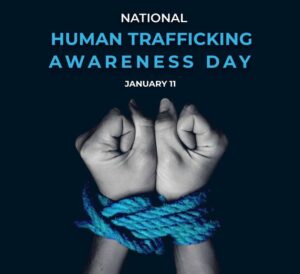National Human Trafficking Awareness Day: 7 Key Facts That You Must Know
National Human Trafficking Awareness Day is observed annually on January 11th to raise awareness about the harrowing issue of human trafficking. This day serves as a reminder of the millions of people around the world, including men, women, and children, who fall victim to this cruel and exploitative crime. Human trafficking is a form of modern-day slavery, where individuals are coerced, deceived, or forced into labor or sexual exploitation.
What is Human Trafficking?
Human trafficking is a global crime that involves the illegal trade of humans for purposes such as forced labor, sexual exploitation, or involuntary servitude. It’s often driven by poverty, social inequality, and a lack of awareness. Victims of human trafficking are frequently subjected to extreme forms of abuse, violence, and manipulation, and they often find themselves trapped in dangerous situations from which it can be difficult to escape.
Human traffickers use various methods to prey on vulnerable people, such as promising them employment, education, or a better life, only to exploit them once they are in a position of vulnerability. According to the United Nations, human trafficking is one of the most significant forms of organized crime worldwide, affecting nearly every country on the planet.
History of National Human Trafficking Awareness Day
National Human Trafficking Awareness Day was first observed in 2007, and it was established by President George W. Bush as part of the Trafficking Victims Protection Act (TVPA), which had been passed in 2000. This law was designed to combat human trafficking by strengthening laws, supporting survivors, and increasing efforts to reduce the demand for trafficked individuals. January 11th was chosen as a day to highlight the critical need for greater awareness and action against human trafficking.
On this day, various organizations, activists, and governments hold events, campaigns, and educational programs to inform the public about human trafficking and encourage them to take action. Awareness initiatives focus on educating communities about the signs of trafficking, providing resources for victims, and calling for stronger laws to protect vulnerable individuals.
Daily Life Impacts of Human Trafficking
Human trafficking affects not only the victims but also society at large. It has serious implications for global economies, public health, and personal safety. Here are a few ways human trafficking impacts daily life:
- Economic Cost: Human trafficking is a multi-billion-dollar industry. It drives illegal trade, undermines legitimate businesses, and harms the global economy by exploiting vulnerable individuals for cheap labor or sex.
- Public Health Concerns: Victims of trafficking often suffer from physical and mental health issues, including sexual abuse, violence, malnutrition, and diseases such as HIV/AIDS. The trauma inflicted on victims can lead to long-term psychological damage, including post-traumatic stress disorder (PTSD) and depression.
- Social Disruption: Human trafficking contributes to social instability by perpetuating a cycle of exploitation, where victims are kept in a constant state of fear and uncertainty. This can lead to communities being torn apart by crime, poverty, and human suffering.
- Impact on Vulnerable Populations: Human trafficking disproportionately affects marginalized groups, including women, children, refugees, and migrant workers. These individuals are more likely to fall prey to traffickers due to lack of social support and economic opportunity.

Facts About Human Trafficking
Here are 7 powerful facts about human trafficking that highlight the urgency of awareness and action:
- Over 40 Million People are Affected Globally: According to the Global Slavery Index, over 40 million people are estimated to be living in modern-day slavery, with many of them trafficked for labor or sexual exploitation.
- Children are Particularly Vulnerable: Children make up a significant portion of human trafficking victims. It’s estimated that 1 in 4 victims of trafficking are children, often trafficked for forced labor, sexual exploitation, or child soldiering.
- Human Trafficking is Present in Every Country: Human trafficking is not confined to developing nations but is a global issue. Trafficking occurs in both developed and developing countries, affecting individuals from all walks of life.
- Sex Trafficking is Common: Many human trafficking cases involve sex trafficking, where victims are coerced into prostitution or pornography. This often happens through deceptive offers of employment or relationships.
- Labor Trafficking is Widespread: Victims of labor trafficking are often forced to work in industries such as agriculture, construction, and manufacturing. These individuals face grueling conditions, long hours, and little to no pay.
- Traffickers Target Vulnerable Populations: Those who are impoverished, homeless, or lacking social support are particularly vulnerable to traffickers’ tactics. Refugees, migrants, and people from marginalized communities are often targeted.
- The Fight Against Trafficking is Ongoing: Governments, NGOs, and international organizations continue to fight against human trafficking, but the problem persists. Increased awareness, better enforcement of laws, and more resources for victims are critical for combating this issue.
Significance of National Human Trafficking Awareness Day
National Human Trafficking Awareness Day is a crucial opportunity to educate the public about the severe and widespread nature of human trafficking. It serves as a day to raise awareness, promote action, and encourage people to get involved in preventing trafficking and supporting victims.
- Informs the Public: By observing this day, people can become more educated on how to spot the signs of human trafficking and how they can report it to authorities.
- Empowers Communities: This day encourages individuals, communities, and organizations to take a stand and actively contribute to the fight against human trafficking.
- Supports Victims: The day also brings attention to the resources available for survivors of trafficking, including shelters, legal aid, and rehabilitation programs.
- Advocates for Stronger Laws: National Human Trafficking Awareness Day serves as a reminder to governments that they must continue to strengthen laws and policies that protect individuals from trafficking and provide justice for victims.
How Can You Observe National Human Trafficking Awareness Day?
On National Human Trafficking Awareness Day, here are some ways you can take part in raising awareness and helping the cause:
- Educate Yourself and Others: Learn about the signs of human trafficking and educate others in your community. Many resources are available online and through organizations dedicated to combating human trafficking.
- Support Anti-Trafficking Organizations: Donate to or volunteer with organizations that are actively working to fight human trafficking and support survivors.
- Advocate for Stronger Laws: Push for legislative action that strengthens laws against trafficking, increases support for victims, and improves enforcement efforts.
- Spread the Word: Use social media to share information about National Human Trafficking Awareness Day, educate your followers, and encourage them to get involved.
FAQs
Q: What is human trafficking? A: Human trafficking is the illegal trade of humans for the purposes of forced labor, sexual exploitation, and other forms of abuse.
Q: When is National Human Trafficking Awareness Day observed? A: National Human Trafficking Awareness Day is observed annually on January 11th.
Q: How can I help fight human trafficking? A: You can help by educating yourself and others, supporting anti-trafficking organizations, advocating for stronger laws, and raising awareness through social media.

Conclusion
National Human Trafficking Awareness Day is an important occasion to reflect on the global issue of human trafficking and the actions we can take to help end it. By raising awareness, supporting survivors, and advocating for stronger laws, we can all play a part in the fight against human trafficking. Together, we can work toward a world where every individual is free from exploitation, abuse, and fear.










